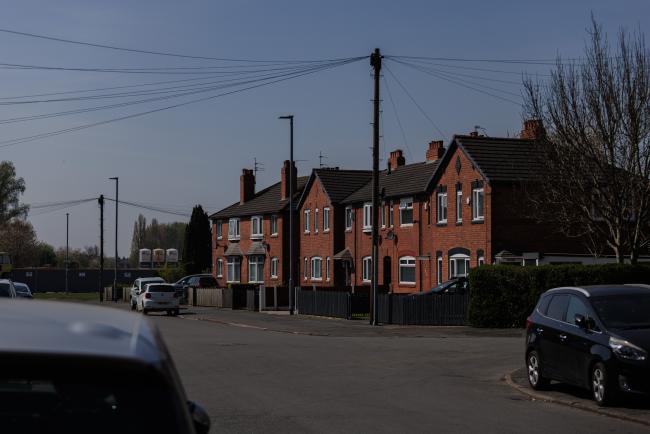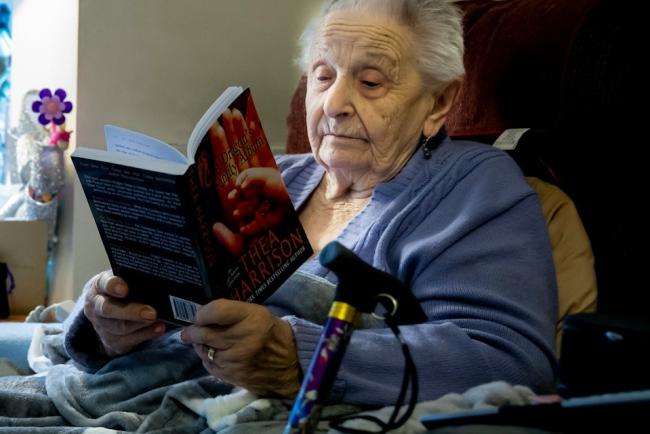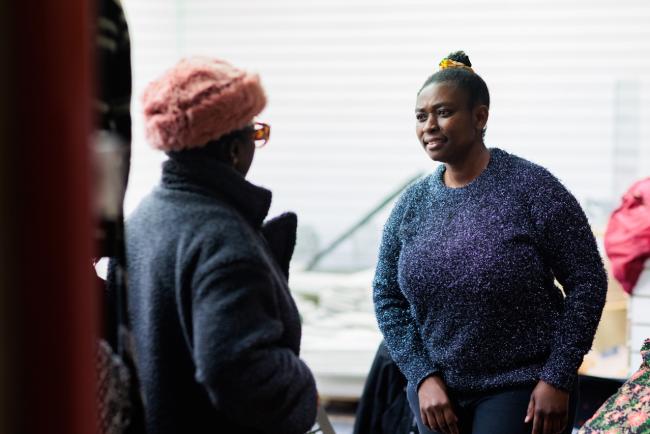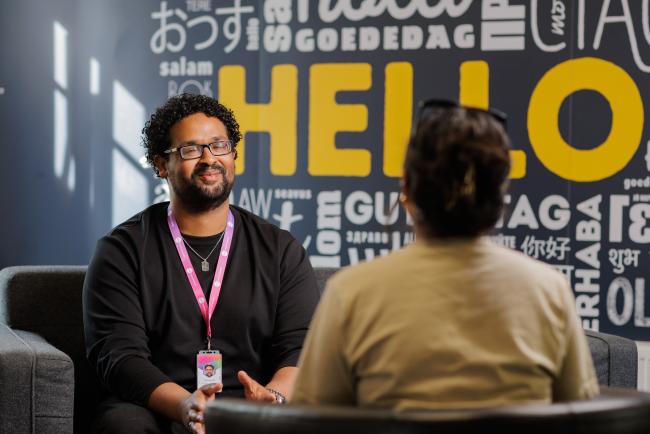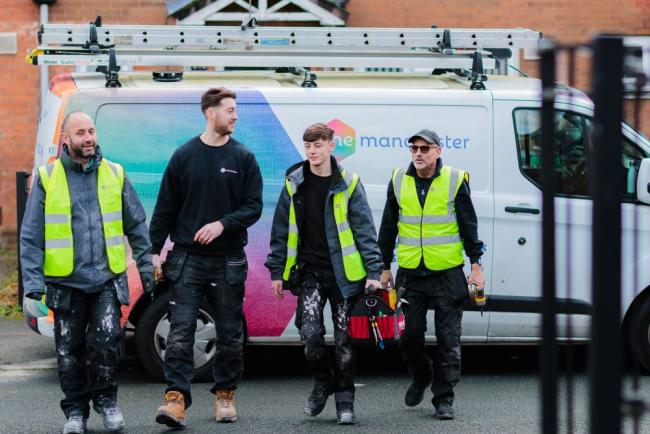Are you on top of your money, or is your money on top of you?
If you spend money without thinking about what's coming in and going out, this money quiz can help you have a better understanding of your situation.
For each question select one answer that best matches you. Add up the score at the end and see how you did.
1. Which of the following best describes your views on money?
A. Money is important because it shows how successful and powerful you are.
B. It is important to have savings, you never know when you may urgently need the money.
C. I often demonstrate my love to people by buying them things.
D. With enough money, you can do whatever you want.
2. How do you feel about how you manage your money?
A. I have some money worries but I manage day-by-day.
B. I feel in control of my finances.
C. Money is a constant source of stress.
D. I don’t think about my finances that much.
3. How do you feel about putting away savings?
A. I’m focused on making ends meet day-to-day, saving money isn’t a priority for me at the moment.
B. I’d rather save money than spend it.
C. I’d like to have some savings but I struggle to put money away.
D. There’s no point saving anything as banks pay so little interest on it.
4. What’s your biggest financial worry?
A. I’ve got lots of debt and I don’t know how I’m going to pay it off.
B. I often run out of money and go overdrawn, borrow on my credit card or miss payments.
C. I get by day-to-day but I’ve not managed to save anything.
D. It would be nice to have more money but I don’t have any real financial worries.
5. If you use a credit card, which statement best describes how you repay it?
A. I always pay my credit card off in full every month or don’t have a credit card.
B. I’m in arrears on my card and can’t afford to pay it off.
C. I pay whatever the bank tells me I have to pay on my credit card each month – the minimum repayment.
D. I usually clear my credit card each month but sometimes overspend and take a month or two to pay it off.
6. Do you save money?
A. I have no savings and couldn’t afford to start saving.
B. I try to save and I’ve got some money stashed away.
C. I save up for things when I want to buy something – holiday, Christmas gifts, a car – but don’t save regularly.
D. I put some money into a savings account every month.
7. Imagine your car is essential to you, you need it to get to work or do the weekly shop, but it breaks down and the garage says it’ll cost £650 to fix it. What would you do?
A. Put it on my credit card or borrow from friends or family.
B. I might dip into my savings but I’d be able to afford it .
C. I’d struggle but if I cut back I could just about cope.
D. I might be able to get a payday loan but there’s no other way I could find £650.
8. Your gas and electric company suddenly realises they’ve been overcharging you, so refunds £400. What would you do with the money?
A. I’d save it.
B. I’d pay off some debt.
C. I’d use it to treat my family or friends.
D. I’d buy the outfit/computer/holiday I’ve been wanting for a while.
9. How do you plan your spending?
A. I don’t really plan my spending, I just go with the flow and hope there’s enough money left at the end of the month.
B. I set a budget and tend to stick to it pretty well.
C. I try to control my spending but I can never understand where the money goes.
D. I don’t actively plan my spending but I keep track of how much is in my bank account to make sure I have enough to pay my bills.
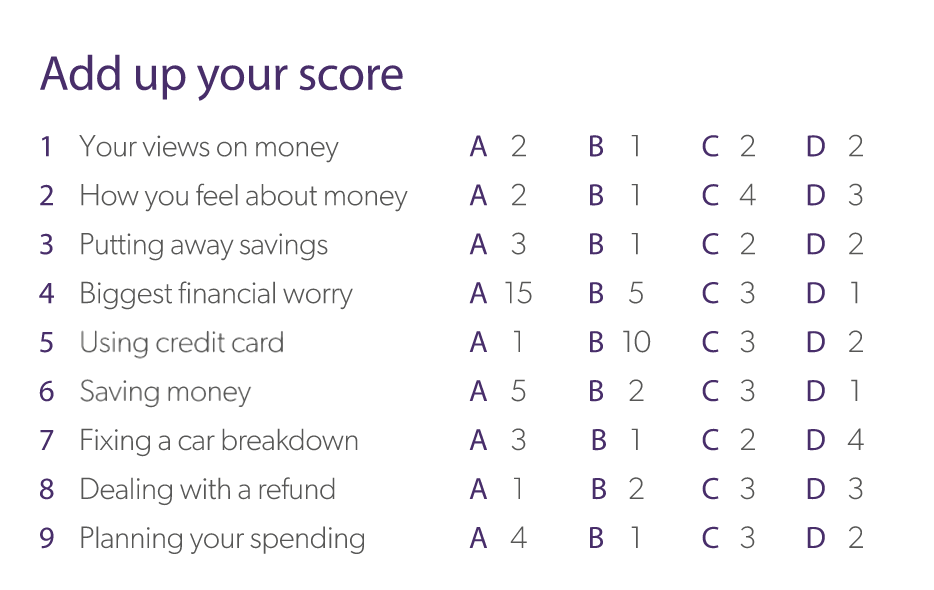
What your total means
17 or less: On top! Focus on your future to achieve your goals.
You’re really on top of your day-to-day finances and in a great position to cope with life’s surprises. Well done! Now you can think about your long-term future and making the most of your money. Do you have any burning goals like buying a house or a dream holiday? Are you prepared for retirement?
18-24: Managing day-to-day. Start to put a bit by each month.
You’re getting by right now but one major financial shock could set you back. Could you and your family cope if you lost your job or fell ill? Saving even a small amount each month can make a big difference. It’s easier than you think. Maybe you want a holiday or a debt-free Christmas?
25-31: Struggling to make ends meet. Budget to take control.
You’re not in financial difficulty but a small financial shock or unexpected bill could push you into trouble. Take control. Look closely at your income and spending then decide what you want. Budgeting is not about giving up things that make you happy, it’s about making the most of your money.
32 or more: In debt difficulty. See a free debt adviser now!
If you’re in debt that you don’t know how to pay off then you need professional advice to guide you through. Luckily, that’s available for free. Our specialised money and debt advisers offer expert support to help you back to financial health. The sooner you do this, the more successful it’s likely to be and the faster the weight will lift off your shoulders.
If you're struggling with your finances then get in touch with our One Money team, who will be happy to help you resolve any issues. You can email them at onemoney@onemanchester.co.uk or call 0330 355 1000.
For more information about the support the One Money team provide, click the button below.


